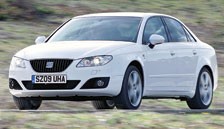At one level, January brought some good news to the fleet sector, with registrations up by 24.1%.
The downside was that the overall market rose 29.8%, which means that fleet market share dropped slightly from 52.2% to 50.0%.
Overall, that was a respectable result, as the January retail market was boosted so strongly by the scrappage scheme.
At a manufacturer level, Ford extended its lead over Vauxhall.
Back in January 2008, Vauxhall’s fleet registrations were 14.5% behind Ford, but the gap has now widened to 21.2%.
There is no prospect of Vauxhall repeating its achievement for full year 2008 when it briefly took fleet market leadership.
Obviously, Vauxhall is fighting hard to re-establish its credibility with fleets (and certainly the new Astra is one of the better weapons with which to fight that battle), but the fact it is clearly now number two in the fleet market is not all bad news.
It removes the temptation to try the “one more heave” approach to win leadership by yet more discounting.
Behind Vauxhall are Volkswagen and Audi, both with big gains in January. In fact, if one looks at fleet sales at the level of corporation rather than brand, Volkswagen is poised to become the largest fleet company in the UK, with a 14,378 sales across Volkswagen, Audi, Seat and Skoda in January.
Once Ford separates from Volvo, Volkswagen is likely to overtake it at a group level.
That is not due to any failings by Ford (although its high list prices are doing no favours to the P11D costs of its customers), but is rather a reflection of Volkswagen’s remarkable strength in depth.
Both Volkswagen and Audi have had the best results in their respective sectors over the past five years, Skoda is a success internationally and Seat, long the problem child, is now making some headway in the UK thanks to the Audi-based Exeo.
Behind Volkswagen and Audi come the French. All three manufacturers (Peugeot, Citroën and Renault) have made big gains.
In the case of Peugeot and Citroën this is partly due to steadily improving model ranges.
Peugeot is developing a good line in niche vehicles with the 3008 and 5008, while Citroën has the much improved C3, with the DS still to come.
Renault’s gain is a combination of better product (especially the new Megane which is a quantum leap ahead of its predecessor) and a decision to concentrate more effort on fleet sales – the company said in its financial results that it had been “over prudent” in cutting back on fleet sales in 2008 and early 2009.
However, the biggest winner has been Korea. One might have expected the scrappage scheme to have absorbed all the efforts of Hyundai and Kia – after all, it could have been tailor-made for value brands that have a strong appeal to an older demographic.
However, Koreans are ambitious, and are determined to push ahead on both retail and fleet fronts simultaneously.
In particular, the whole of Hyundai’s mainstream range is virtually brand-new, and with such a radically-improved line-up, it can make a credible play for fleet buyers.
The only danger is growing too fast, too soon and damaging their long-term appeal through falling residuals – but that is a potential problem most carmakers would be happy to have.

















Login to comment
Comments
No comments have been made yet.